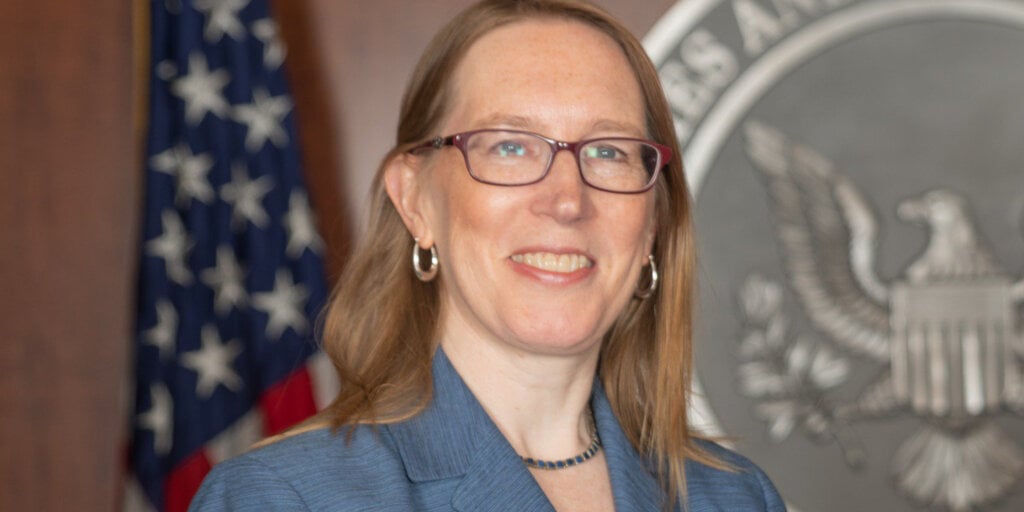U.S. Securities and Exchange Commissioner Hester Peirce used her opportunity on stage at ETH Denver to sustain her criticisms of her own agency, expressing frustration over “regulating by enforcement” and lambasting the SEC for dragging its heels on approving spot Bitcoin ETFs.
“The Grayscale case basically gave us the option of approving a Bitcoin exchange-traded product, and it's remarkable to me that it took a court to tell us that we had to do that,” Peirce said during a “fireside” conversation with CNBC’s MacKenzie Sigalos. “I started in 2018. That summer, we had our first Bitcoin exchange-traded product come before us as a commission. And I thought back then—which was quite a long time ago now—we should have said yes to it.”
What will the agency say to applications now pending to offer Ethereum spot ETFs?
“I'm sure people here are interested in finding out what's going to happen,” she acknowledged. “I'm going to use the lawyer’s answer and say it's under consideration at the SEC—there's not a lot I can say on that.”
One of the many complaints the cryptocurrency industry aims at the SEC is that the agency is using enforcement actions in lieu of regulation, suing crypto companies like Ripple, Coinbase, and Lbry. Peirce, who speaks regularly at crypto events and finds a sympathetic audience for her critiques, blasted the SEC for acting after the fact rather than establishing clear regulatory guidelines in advance.
“Some of the choices that the SEC has made are very strange from the perspective of people who favor regulation as a solution,” Peirce said. “Because when you push entities away from the U.S., you're actually pushing them outside of the control or the reach of regulatory agencies in the U,S.”
Peirce again suggested a common sense approach would be better.
“If you really want to sort the bad behavior from the good behavior, having rules that are clear to people who want to follow them is a much better approach than doing this, parachute in later with enforcement,” she said.
Crypto enthusiasts and policymakers should work together to come up with ideas ready to go when SEC chair Gensler changes his views on cryptocurrency, Peirce said.
“The idea of the token ‘safe harbor’ is, let's get some basic disclosure out there, and then let's allow projects time to get to that decentralization point,” she explained. ”Ideas which people are welcome to iterate on and some people have already done.”
In October 2021, U.S. Representative Patrick McHenry introduced the Clarity for Digital Tokens Act of 2021, which would create a so-called safe harbor that aligned with Peirce’s own proposal and would give crypto startups up to three years to demonstrate “network maturity” and become decentralized to the point that their associated tokens no longer meet the definition of securities under federal law.
Bitcoin has gained some legitimacy in the eyes of the SEC because it is “sufficiently decentralized.”
While Peirce advocates for fair cryptocurrency regulations by the SEC, she also reiterated the agency’s important role in prosecuting fraud in the crypto space.
“If you're talking about fraudsters who are ripping people off, certainly I think we want someone to be there to go after those kinds of people,” she said. “But I still think we're better off sitting down and thinking through what regulation makes sense in this in this area. And that should be a conversation. It shouldn't be a one-sided conversation through ‘read our latest enforcement press release.’”
Peirce did admonish investors who run to regulators for help when they make a bad trade or decision.
“What drives me crazy is when people are like ‘government, stay out,’ and then something bad happens, and then they say ‘government, why didn't you protect me? Why didn't you tell me not to invest in this?’” Peirce said. “With freedom comes responsibility.”
Edited by Ryan Ozawa.




